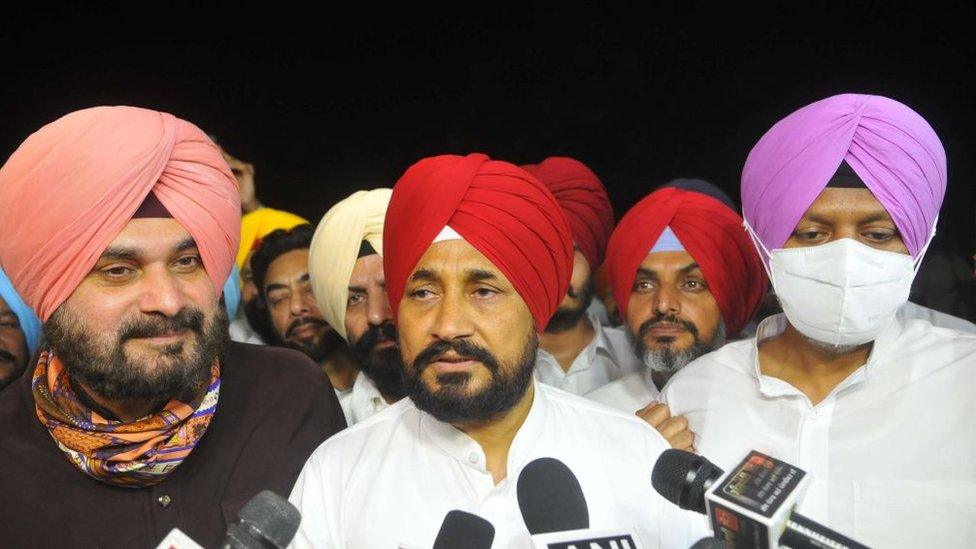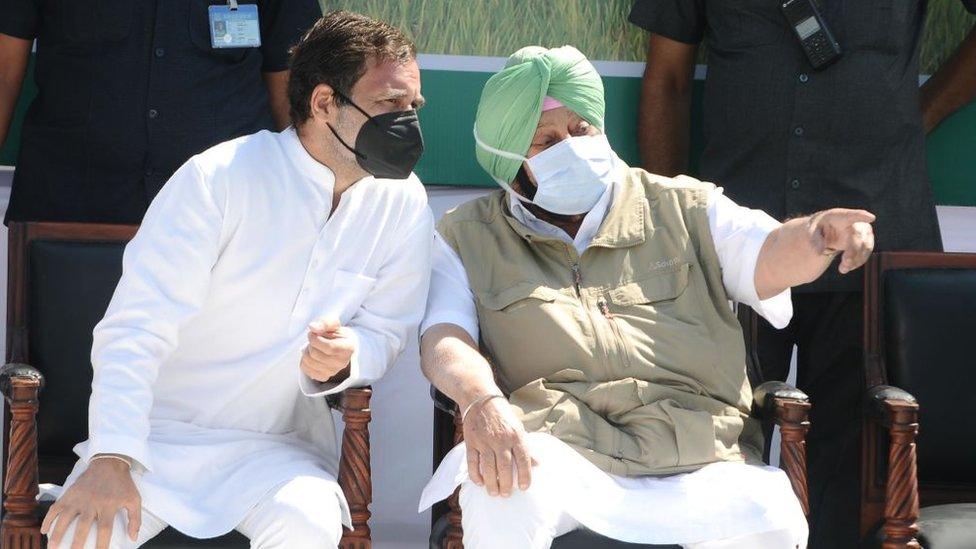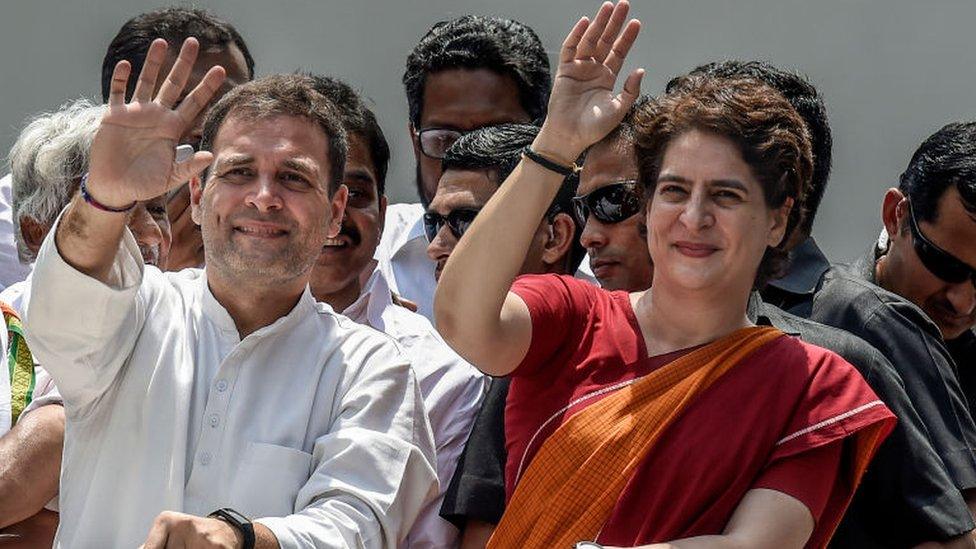Charanjit Singh Channi: What Punjab leadership change says about Congress
- Published

Charanjit Singh Channi (C) has become the new Punjab chief minister amid a crisis
The latest political turmoil in the northern Indian state of Punjab reflects a deeper structural crisis within the main opposition Congress party, writes journalist Puneet Nicholas Yadav.
Charanjit Singh Channi, a 58-year-old Dalit (formerly untouchable), is now the new chief minister of Punjab, one of just three Indian states where the Congress is in power. His appointment was announced late on Sunday after a day of frantic meetings among party leaders.
Mr Channi, a three-time legislator, has replaced Congress party veteran Captain Amarinder Singh, who is an ex-solider and has been a politician for more than five decades. The 79-year-old served as the chief minister for nine-and-a-half years in Punjab.
In a move that left many political observers in India stunned, the party manoeuvred Mr Singh's resignation last week. "I feel humiliated... I feel they have no confidence in my work," he said, external after quitting.
This came after months of attempts by top Congress leaders to broker peace between Mr Singh and his growing list of detractors - state lawmakers who accused him of being inaccessible and running the government through a coterie of bureaucrats who ran roughshod over elected representatives.
The change has come just four months ahead of the next assembly elections. Despite the inept handling of the crisis all along, Mr Channi's appointment shows an uncharacteristic political savvy on the part of the Gandhis - Congress party president Sonia Gandhi, her son, Rahul Gandhi and daughter, Priyanka Gandhi Vadra.
The three make up the party's top leadership, often known as the "high command". They traditionally shy away from breaking the status quo but Mr Channi's elevation to chief minister fractures the power held by the Jat Sikh community since the state's creation in 1966,. And it also appeals to the Dalits, a dominant vote bank not just in Punjab but in all-important Uttar Pradesh state, which is likely to go to the polls in February 2022.
Whether the move will pave the way for more such surprises in states where the Congress is in a deep morass is too early to say, but Rahul Gandhi's confidantes insist that top leaders are keen on stepping out of the comfort zone.
It hasn't been a particularly happy year thus far for chief ministers of Prime Minister Narendra Modi's Bharatiya Janata Party (BJP)-governed states either - four of them across three states have been swiftly replaced since March. But no-one expected the Congress to effect a similar plan against one of its most visible leaders.
In recent years, especially since their defeat in the 2019 parliamentary elections, the Congress - the principal opposition party to the BJP - has been critiqued routinely for its inertia.
Tensions within the party have been allowed to simmer for too long and mounting electoral defeats have rarely been audited with honesty to hold non-performers to account.
The BJP, comfortably in power in more than a dozen states, is perpetually in election mode, but the Congress often behaves like a transient electoral entity.

Amarinder Singh (R), seen here with Rahul Gandhi, is a Congress party veteran
The crisis in Punjab had been in the making for over three years as anger against Mr Singh and anti-incumbency against his government rose. But the Gandhis did little. On the contrary, their decision to push through the appointment of former cricketer Navjot Singh Sidhu, a bitter critic of Mr Singh who had quit the BJP to join the Congress just five years back, as the party's state unit chief made the crisis worse.
Similar friction has been simmering between factional heads in the other two states - Rajasthan and Chhattisgarh - where the Congress is currently in power but repeated assurances of a prompt resolution have shown no results. "At a time when the centre [the BJP] is handing the opposition issues for mass agitations on a platter and other regional opposition parties are taking the fight to the BJP, the Congress is busy fighting itself," said Sanjay Jha, a former Congress spokesperson, who was sacked by the party last year for criticising its functioning.
Adding to the party's woes is its leadership vacuum. Sonia Gandhi has been the interim chief since Rahul Gandhi resigned from the post after the party's defeat in 2019.
Each successive poll rout for the Congress has emboldened critics of the Gandhis, both within the party and outside. "It is amazing that our current leadership doesn't realise that internal stability in the Congress is co-terminus with its stint in power and the ability of the Gandhis to win elections for the party," said a veteran Congress functionary who is now out of favour with the party's top leaders.

Rahul and Priyanka Gandhi are in confrontation mode, say party leaders
The Gandhis and a section of their confidantes are now mulling over inducting political strategist Prashant Kishor, who has scripted several electoral wins in recent years, into the party. But the idea is reportedly opposed by other leaders.
Congress sources say the younger Gandhis are in a confrontational mood - not just against the BJP but also against the naysayers within the party. "How the party humiliated Amarinder Singh shows that Rahul and Priyanka want to reassert their family's hegemony. Sonia Gandhi's strength was that she was a consensus builder and would never act in haste. Rahul and Priyanka act on a 'love/hate at first sight basis'," a Congress MP said.
While there is nothing wrong with the Gandhis wanting to run the party more firmly, the MP added, "it's also essential that they find the right people for the job… this has, so far, not happened and if you see people promoted by the brother-sister duo as in-charges... you will know how bad their choices are".
Over the past month, as the Gandhis have become more aggressive in their verbal attacks against the BJP and shown decisiveness in controlling rebellion with the party, calls for Mr Gandhi's return as party president have begun again.
In-house critics of the family aren't thrilled but have been keeping their counsel. Is another flashpoint on the cards - and if so, will the Gandhis prevail?
Puneet Nicholas Yadav is Delhi-based journalist who covers the Congress party